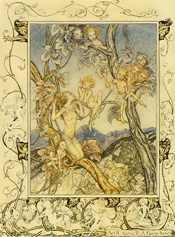
21 May 2010
A Midsummer Night’s Dream
A Midsummer Night’s Dream, a comedy in five acts with incidental music.
Mozart and Salieri, an opera in one act consisting of two scenes.
Nicolai Rimsky-Korsakov (1844-1908), composer. Libretto derived from Alexander Puskhin's play of the same name.
First performance: 7 December 1898 in Moscow.
Ariadne auf Naxos, Oper with a prologue and one act. Music composed by Richard Strauss. Libretto by Hugo von Hofmannsthal.
La Vestale, a tragédie lyrique in three acts.
Boris Godunov, an opera in four acts with prologue
Modest Mussorgsky, composer. Libretto by the composer, based on Alexander Pushkin's drama Boris Godunov and Nikolai Karamazin's History of the Russian Empire
First performance: 8 February 1874 at the Mariinsky Theatre, St. Petersburg
Il Trovatore, dramma in four parts.
Only a few months following the premiere of Der Rosenkavalier, Hugo von Hofmannsthal proposed a new opera to Richard Strauss based on Molière’s comedy-ballet, Le Bourgeois gentilhomme (in German, Der Bürger als Edelmann).
Die Entführung aus dem Serail, Singspiel in 3 Acts.
Music composed by Wolfgang Amadeus Mozart (1756–1791). Libretto by Johann Gottlieb Stephanie the Younger, based on an earlier libretto by
Christoph Friedrich Bretzner.
Die Entführung aus dem Serail, Singspiel in 3 Acts.
Music composed by Wolfgang Amadeus Mozart (1756–1791). Libretto by Johann Gottlieb Stephanie the Younger, based on an earlier libretto by
Christoph Friedrich Bretzner.
Arabella: Lyrische Komödie in three acts
Die Entführung aus dem Serail, Singspiel in 3 Acts.
Music composed by Wolfgang Amadeus Mozart (1756–1791). Libretto by Johann Gottlieb Stephanie the Younger, based on an earlier libretto by
Christoph Friedrich Bretzner.
La Gioconda, dramma lirico in four acts.
Music composed by Amilcare Ponchielli (1834–1886). Libretto by Arrigo Boito (under the pseudonym Tobia Gorrio), based upon Victor Hugo's Angelo, Tyrant of Padua (1835).
Don Carlo, an opera in four acts. Music composed by Giuseppe Verdi (1813–1901). Libretto by Joseph Méry and Camille Du Locle after Friedrich von Schiller’s dramatic poem Don Carlos, Infant von Spanien. Revised version in four acts (French text revised by Du Locle, Italian translation by Achille de Lauzières and Angelo Zanardini).
Un ballo in maschera, a melodramma in three acts.
Music composed by Giuseppe Verdi. Libretto by Antonio Somma, based upon the work of Eugène Scribe Gustave III ou Le bal masqué (1833)
Medea: Melodramma tragico in three acts.
Die Tote Stadt, an opera in three acts.
Music composed by Erich Wolfgang Korngold (1897-1957). Libretto by Paul Schott (Julius and E. W. Korngold) after the novel Bruges la morte by Georges Rodenbach.
Some Details concerning the Revolution inaugurated by Rossini
Manon Lescaut, dramma lirico in quattro atti
Elektra: Tragedy in one act.
Lyric Opera of Chicago has announced both schedules and cast-lists for is Spring 2020 performances of Richard Wagner’s Ring Cycle. Given the series of individual productions already staged by the company since Fall 2016, that pave the way for the complete cycle, Lyric Opera of Chicago’s complete production should affirm the artistic might of the great composer.
“Diacono himself does not know what musical talent he possesses” – Mascagni

A Midsummer Night’s Dream, a comedy in five acts with incidental music.
Streaming Audio
Written by William Shakespeare. Incidental music by Felix Mendelssohn (Op. 61).
Dramatis Personæ:
Theseus, Duke of Athens
Egeus, Father to Hermia
Lysander
Demetrius, in love with Hermia
Philostrate, Master of the Revels to Theseus
Quince, a carpenter
Snug, a joiner
Bottom, a weaver
Flute, a bellows-mender
Snout, a tinker
Starveling, a tailor
Hippolyta, Queen of The Amazons, betrothed to Theseus
Hermia, daughter to Egeus, in love with Lysander
Helena, in love with Demetrius
Oberon, King of the Fairies
Titania, Queen of the Fairies
Puck, or Robin Goodfellow
Pease-Blossom
Cobweb
Moth
Mustard-Seed, Faires
Summary:
Egeus orders his daughter Hermia to marry Demetrius; she refuses because she and Lysander are in love. Her friend Helena is in love with Demetrius, who once loved her but now does not. Under the law of Athens, Duke Theseus gives Hermia four days to obey her father on pain of death or confinement to a nunnery. Hermia and Lysander escape this harsh law by running away to the woods. Demetrius pursues them there, with Helena pursing him. In the woods, Oberon and Titania, King and Queen of fairies, have quarreled because Titania refuses to hand over an Indian changeling boy to be Oberon's page. Oberon instructs the mischievous Puck, Robin Goodfellow, to press the juice of a magic flower on Titania’s eyes as she sleeps; it will make her fall in love with the first being she sees on waking. In an attempt to reconcile The dangerous eroticism of the play, with a queen kissing a humble weaver who wears the ears of an ass, was further emphasized in Michael Boyd’s 1999 production, with Josette Simon as Titania and Daniel Ryan as Bottom, Demetrius and Helena, Oberon orders that juice should be put on his eyes whilst he is sleeping and she is near, but Robin mistakenly puts it on Lysander, who thus falls in love with Helena. She thinks she is being mocked. Love-juice is then placed on Demetrius’ eyes in order to rectify the mistake, but the result is that he too falls for Helena. The boys fight over her and the girls quarrel. While Titania has been sleeping, a company of Athenian artisans under the leadership of Peter Quince has come to the wood to rehearse a play for the ensuing wedding festivities of Duke Theseus and Hippolyta, Queen of the Amazons. Robin puts an ass’s head on Bottom the weaver and because of the love-juice Titania falls in love with him. Eventually all is restored to right and the artisans perform their comically tragic play of ‘Pyramus and Thisbe’.
[Summary Source: RSC Shakespeare]